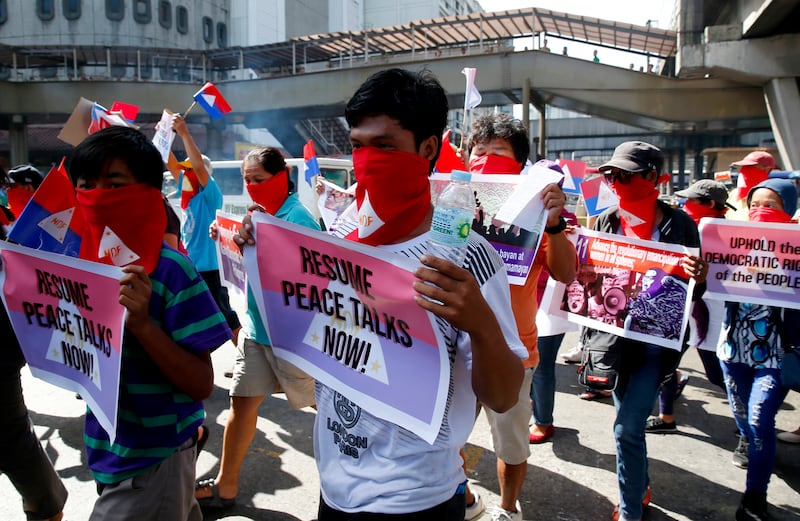The Philippine National Security Council accused communist rebel leaders on Wednesday of doubling down in their efforts to overthrow the government and being insincere about their motives in wanting to resume peace talks.
The council remains “very perplexed and disappointed” by recent statements of the Communist Party of the Philippines that called on its dwindling forces to consolidate to carry on with the Maoist insurgency, Jonathan Malaya, the NSC’s assistant director and spokesman, told reporters.
He said a statement issued by the CPP on Dec. 26 goes against what the outlawed party had agreed to with the Marcos administration in November during a secret meeting in Oslo brokered by Norway. On Nov. 23, both sides signed an agreement to resume peace talks after a six-year hiatus.
“If you are going to read the statement of the CPP, they are still determined to regroup and rebuild what remains of its forces, to continue its protracted war in hopes of achieving its end goal of overthrowing our democratic government,” Malaya said on Wednesday, referring to the Dec. 26 statement from the communist party.
“The CPP instead has called for a rectification movement doubling down on its commitment to carry forward the armed struggle,” Malaya said.
In that statement marking its 55th anniversary, the CPP called for a "rectification movement" to address and resolve the "long-running weaknesses and errors" that have "impeded and stunted" growth.
The statement also called on cadres with the New People’s Army – the CPP’s military wing – to establish additional guerrilla fronts, zones and base areas in mountainous regions while launching “basic or annihilative tactical offensives” against “isolated and detached units of the enemy.”
The CPP issued the statement a day after government forces killed nine suspected NPA guerrillas on Christmas day during a firefight in the southern Philippines.
About a week after the Oslo deal was announced, Vice President Sara Duterte called the decision "an agreement with the devil" in her first public rebuttal of President Ferdinand Marcos Jr., who succeeded her father.
In response to her statement, armed forces chief Gen. Romeo Brawner Jr. said resumption of the talks could have a positive outcome, but he was not willing to call on troops to lay down their firearms unless directly ordered by Marcos, the commander-in-chief.
“I cannot blame the vice president for saying this. In fact this opinion is shared by many in the country, even soldiers,” Brawner told reporters at the time.
In 2017, then-President Rodrigo Duterte canceled peace talks with the rebels after accusing them of attacking government forces while negotiating for peace. The CPP and NPA have been waging a rebellion against Manila since 1969, the longest-running insurgency in Asia.

Hopeful, optimistic
Even as the NSC and the National Task Force to End Local Communist Armed Conflict (NTF-ELCAC) remain “hopeful and optimistic” of the exploratory talks between the two sides, they “cannot turn a blind eye to the CPP’s anniversary statement,” Malaya said.
“While we support the exploratory talks, its success will entirely depend on the sincerity, truthfulness and commitment of the CPP-NPA-NDF toward achieving a peace settlement and ending armed hostilities,” he said.
If the communists are committed to finally ending the armed conflict, Malaya said, they should “work with the government to find a way, no matter how difficult or challenging it will be in achieving it.”
“Given its recent statement, the sincerity of the CPP-NPA in engaging in exploratory talks must be scrutinized by the people carefully,” he said.
“The history of failed negotiations, the continuing perpetration of violence and inconsistent statements all contribute to a narrative that challenges the authenticity of the commitment to a peaceful resolution. It is essential that we approach future discussions with a discerning eye,” Malaya said.
Since launching its insurgency 55 years ago, the CPP boasted having at least 20,000 fighters at its peak in the 1980s, but the government estimates its strength is down to less than 1,500 fighting under 14 “weakened guerrilla fronts.”
“The armed components of the communist terrorist group are on their last leg but this does not mean that we can rest easy in our efforts of clearing barangays of the CTG’s (communist terrorist group’s) influence,” said Ernesto Torres, NTF-ELCAC executive director.
